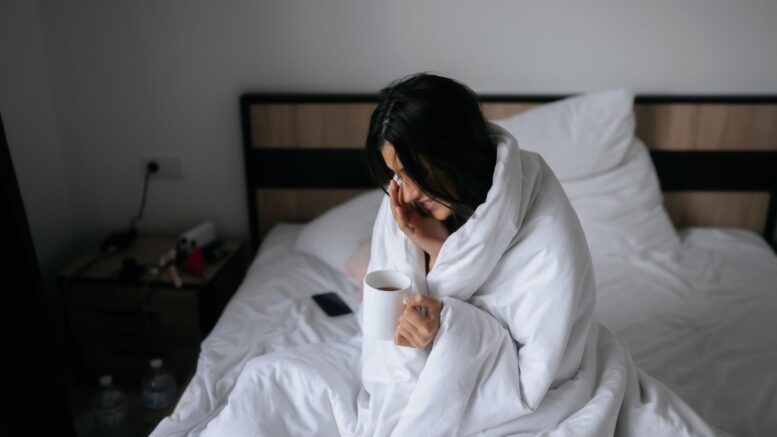Sleep is essential for overall health and well-being, yet many people struggle to get a good night’s rest. You’re not the only one who finds yourself tossing and turning at night. Fortunately, you can increase the quality of your sleep and wake up feeling refreshed every morning by putting these easy yet powerful strategies into practice. This guide will explore five easy tips that can help you sleep better each night, allowing you to enjoy the numerous benefits of restful sleep and wake up feeling energized and ready to tackle the day.
1. Establish a Consistent Sleep Schedule:
The most important thing for a good night’s sleep is to stick to a regular sleep schedule. Your body’s internal clock, known as the circadian rhythm, regulates the cycle of awakening and falling asleep. Every day, including on weekends, you can help synchronize your circadian cycle and enhance the quality of your sleep by going to bed and getting up at the same time. Developing a consistent nighttime routine might also help your body recognize when it’s time to relax and get ready for sleep.
Reading, having a warm bath, or engaging in relaxation exercises like meditation or deep breathing are a few examples of this schedule. By keeping a consistent sleep schedule and bedtime routine, you can teach your body to sleep better and wake up feeling refreshed.
2. Create a Comfortable Sleep Environment:
The environment in which you sleep has a big impact on the quality of your sleep. You can sleep through the night and fall asleep more quickly if your sleeping environment is comfortable. To begin with, make sure your bedroom is cold, quiet, and dark—all of which are good for sleep. To completely block off light, use blackout curtains or an eye mask.
To muffle distracting sounds, use earplugs or a white noise machine. Additionally, invest in a comfortable mattress and pillows that provide adequate support for your body. Your bedroom should be a comfortable haven free from discomfort and interruptions where you can relax and rest.
3. Limit Screen Time Before Bed:
In today’s digital age, many of us are guilty of spending too much time staring at screens, especially before bedtime. Electronic gadgets such as laptops, tablets, and smartphones emit blue light, which can interfere with your body’s normal circadian rhythm and make it more difficult to fall asleep. Reduce the amount of time you spend on screens one hour before bed to enhance the quality of your sleep. Rather than watching TV or browsing social media, choose sleep-inducing activities like reading a book, relaxing music, or practicing relaxation methods.
By reducing your exposure to blue light and engaging in calming activities before bed, you can help your body wind down and prepare for a restful night’s sleep.
4. Avoid Stimulants and Heavy Meals Before Bed:
The foods and beverages you consume in the hours before sleep might also affect how well you sleep. It might be difficult to fall asleep and stay asleep during the night if you use stimulants like caffeine and nicotine close to bedtime. Similar to this, consuming heavy or spicy meals can lead to indigestion and discomfort, which makes it more difficult to obtain a good night’s sleep. Avoiding stimulants like caffeine and nicotine in the hours before bedtime will help you sleep better.
Instead, choose lighter, more easily digested meals. Additionally, try to avoid drinking too much liquid before bed to prevent middle-of-the-night trips to the bathroom that can disrupt your sleep.
5. Consider Natural Sleep Aids:
If you’re struggling to fall asleep or stay asleep despite implementing healthy sleep habits, you may want to consider natural sleep aids like herbal supplements or relaxation techniques. Herbal remedies that enhance relaxation and sleep quality include melatonin, valerian root, and chamomile. Furthermore, you can help relax and get your body ready for sleep by practicing deep breathing, gradual muscle relaxation, and guided imagery.
Another natural sleep aid to consider is Delta 9 gummies, which contain hemp-derived cannabinoids that may help promote relaxation and reduce anxiety, leading to better sleep quality. You can boost your ability to fall asleep and have a pleasant night’s sleep by adding these all-natural sleep aids into your bedtime routine.
Conclusion
In conclusion, improving your sleep quality doesn’t have to be complicated or time-consuming. You can set yourself up for better sleep every night by putting basic and straightforward ideas like making a pleasant sleep environment, limiting screen time before bed, avoiding stimulants and heavy meals, and thinking about natural sleep aids into practice. Keep in mind that each person has unique sleep demands, so figuring out what works best for you may need some trial and error.
Article fact-checked and edited by our editorial team.
References
- Baranwal N, Yu PK, Siegel NS. Sleep physiology, pathophysiology, and sleep hygiene. Prog Cardiovasc Dis. 2023 Mar-Apr;77:59-69. doi: 10.1016/j.pcad.2023.02.005. Epub 2023 Feb 24. PMID: 36841492.
- Ranum RM, Whipple MO, Croghan I, Bauer B, Toussaint LL, Vincent A. Use of Cannabidiol in the Management of Insomnia: A Systematic Review. Cannabis Cannabinoid Res. 2023 Apr;8(2):213-229. doi: 10.1089/can.2022.0122. Epub 2022 Sep 23. PMID: 36149724.
- Arshad D, Joyia UM, Fatima S, Khalid N, Rishi AI, Rahim NUA, Bukhari SF, Shairwani GK, Salmaan A. The adverse impact of excessive smartphone screen-time on sleep quality among young adults: A prospective cohort. Sleep Sci. 2021 Jan-Mar;14(4):337-341. doi: 10.5935/1984-0063.20200114. PMID: 35087630; PMCID: PMC8776263.
